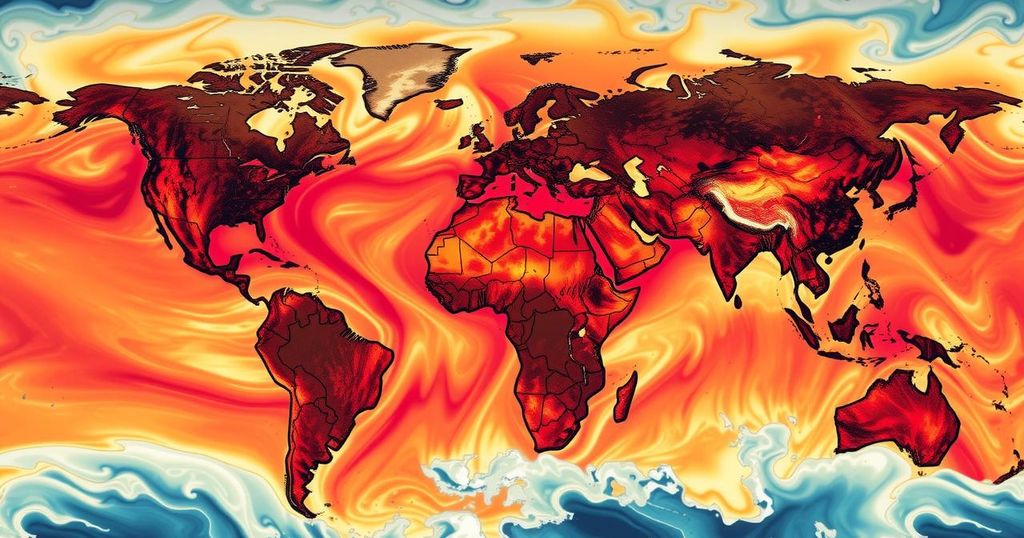Climate change
ACROPOLIS, AFRICA, CALIFORNIA, CLIMATE, CLIMATE CENTRAL, CLIMATE CHANGE, EUROPE, EXTREME WEATHER, FRIED, FRIEDERIKE OTTO, GLOBAL WARMING, GREECE, IMPERIAL COLLEGE, KRISTINA DAHL, NORTH AMERICA, NORTHERN CALIFORNIA, OTTO, SCIENCE, UNITED STATES, WORLD, WORLD WEATHER ATTRIBUTION
Isaac Bennett
0 Comments
2024: A Record Year of Dangerous Heat Linked to Climate Change
In 2024, climate change contributed to an average increase of 41 days of extreme heat worldwide, linking human activities to intensified weather events. Researchers found significant evidence connecting climate change to various extreme weather incidents, demonstrating a need for action to mitigate this growing concern. The statistics highlight the urgency for adaptive measures and communication strategies to better manage the impacts of climate change on vulnerable populations.
In 2024, human-induced climate change resulted in an increase of 41 days of extreme heat worldwide, as reported by scientists from World Weather Attribution and Climate Central. This year is set to be among the hottest on record, marked by numerous severe weather events, including intense heat waves, droughts, and heavy rainfall, leading to considerable disruption globally. The scientific analysis indicates that these events were significantly exacerbated by climate change, affecting millions and claiming thousands of lives.
The research highlighted that some regions experienced over 150 days of extreme heat attributable to climate change, with poorer nations facing even harsher climates. Northern California, Death Valley, and various locations across Europe, Africa, and Asia experienced scorching temperatures that compelled the closure of schools and impacted critical infrastructures. The analysis involved a comparison of daily temperatures in 2024 with expected temperatures in an unaltered climate, yielding alarming statistics yet to undergo peer review.
Many fatalities from extreme heat conditions remain underreported, complicating efforts to raise awareness of the lethal impacts of heat waves. The report reiterates the urgency of cohesive communication regarding heat-related deaths to facilitate better public understanding and preparedness. The findings draw attention to the alarming proximity of global temperatures to the Paris Agreement threshold of 1.5 degrees Celsius, indicating a critical moment for climate action.
The El Niño phenomenon contributed to specific weather patterns earlier this year; however, researchers affirm that climate change had a predominant influence over the severity and frequency of extreme weather events. Studies indicate a clear linkage between climate change and 26 of 29 scrutinized weather catastrophes that resulted in substantial human and economic losses in 2024. Addressing climate change through noted strategic initiatives and adaptive measures is critical for minimizing the adverse effects of future events, as reiterated by experts in the field.
The article discusses the significant impact of climate change on global weather patterns in 2024, particularly highlighting the increase in extreme heat days due to human activities. The statistics shared stem from analyses conducted by reputable climate organizations that emphasize the relationship between anthropogenic climate change and extreme weather events. It raises awareness about the continuing challenges faced by vulnerable populations and stresses the importance of taking collective action to mitigate these adverse effects. Policymakers, scientists, and advocacy groups are urged to pursue robust climate adaptation strategies and reduce greenhouse gas emissions to curb the escalating climate crises.
The findings presented by leading climate scientists underscore a grim reality; climate change is intensifying extreme weather events and posing grave risks to human health and safety worldwide. With 2024 marking a record year for dangerous heat, urgent action is required to address the underlying causes of climate change. Effective communication and strategic preparations at both national and global levels are imperative to mitigate future climate-related tragedies. The urgency for collective action to adhere to international climate agreements is more pressing than ever.
Original Source: www.detroitnews.com




Post Comment